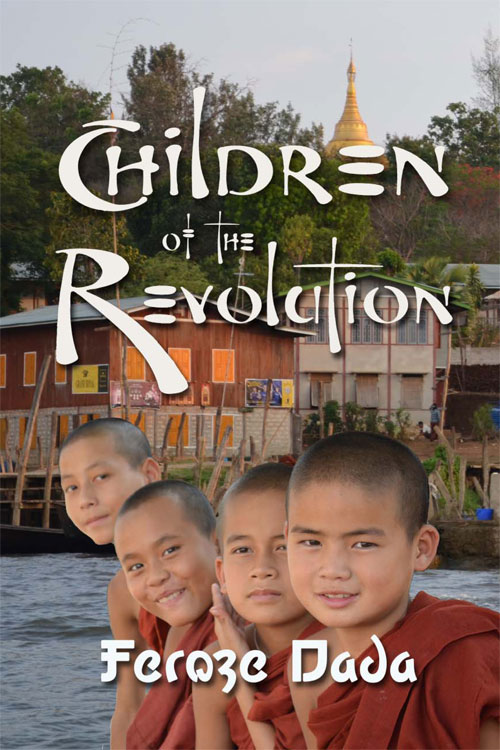|
|
The South
Asian Life & Times - SALT |
|
|||
|
Contents Wildlife
& Adventure
Feature Environment Lifestyle Feature Chef Manish
Chef Vivek Singh Chef Vikram Sunderam
People
Health
Book Reviews In Memoriam
|
|
||||
|
Book Reviews
Children of The Revolution
Published by Filament Publishing Ltd 16, Croydon Road, Waddon, Croydon,
Surrey, CR0 4PA, United Kingdom; 2014
Reviewed by Dilkash Kapur
Dada, while travelling to Myanmar to meet his in-laws, has a chance
encounter with a man with an incredible life, and an incredible tale,
leading to a series of chance discoveries and an incredible story of his
very own. ‘The Major’, tells a tale of survival, and yet is initially
hesitant to divulge the details of his journey, considering the foreboding
threat he faces from his government. Fortunately, Dada persuades him to
share his tale, which we get to now relive. Born to a father that fought for
sovereignty, The Major experienced the powerful beauty of dissent, and the
importance of facing the various adversities of life head-on, at a very
early age. Forced to find work, he finds himself travelling through jungles,
smuggling cattle from Burma to Thailand. He meets thereupon the varied
peculiar folk of the jungle, and realizes that he has a certain skill set
that could drive him forward. It is through an exploration of this that he
finds himself branded a Rebel, earns the nickname ‘The Major’ and gets
caught in the torpid air of political struggle that nestles itself in the
heart of Burma. The Major possesses incredible acumen and the strength of
will to go along with it. He is able to go from an impoverished orphan to a
successful, influential member of society.
Guided by the The Major, Feroze Dada finds himself travelling to the
turbulent areas of the region, to experience the narrative first hand. Dada
and The Major rest at a monastery where the course of their journey
dramatically shifts. The monastery houses and schools 600 orphans and native
children, who depend on government funding along with the help of locals for
their education and other needs. An impoverished facility due to the
problematic political conflict, the children were often sent to live here so
they could find themselves basic food and shelter. The monastery is run by
the sheer will and dedication of a monk named Phongyi, who cares for these
children, and tries to provide them with necessary life skills. The
monastery took time and strife to set up, but in spite of the opposition he
faced, the monk persevered through, to do what he believed was right for the
society and the children that belong to it. The monk tries to provide for
the children’s need, as much as possible, but the monastery is always
wanting for funds.
Dada, stricken and taken aback by the determination of the monk, suggests
bringing the children computers, to adequately equip them for life ahead.
However, computers seem to be a distant dream, since the area lacks basic
amenities such as electricity. Inspired by the monk, Dada struggles, but
manages to find solar powered computers to help the children. This sets off
a series of events, where Dada finds himself actively involved in the
community of a land that was once alien. To generate funds for the
monastery, he set up a unit to bottle the purified mineral water from a
spring close to the monastery. Dada finds himself irrevocably bound to the
monastery and those who belong to it.
The narrative is unique for the way in which it shifts protagonists, and
travels through time. It allows the reader to travel through the heart of
adversity and see the optimistic determination that perseveres through the
spirit of the locals. It also tells the tale of the refusal to be passive in
the face of struggle and chaos, and to be an active participant in not only
one’s own life, but also in the larger spectrums that we thrive in.
Pictorial cues allow the reader to himself experience the journey, without
the need for excessive literally flourish on Dada’s part. The simplicity of
the narrative however sometimes leaves one wanting for more, especially in
the light of the novelty of the tale that is being told. One can however,
respect the stance of the author, because by choosing to avoid complexity
and elaborate literary embellishments, Dada not only maintains the raw truth
unveiled in The Major’s simple words and the Monk’s humble actions, but also
manages to stay true to the subtle passion the people of Burma embody and
imbibe. In its essence, the Children of The Revolution is an understated
testament to the tales that remain untold.
All author profits go to The Inle Trust (Charity Registered in
England 1154767). The book – hard and soft copy-can be purchased via
www.inletrust.org.uk or Amazon)
|
|||||
|
Copyright © 2000 - 2015 [the-south-asian.com]. Intellectual Property. All rights reserved. |
|||||
